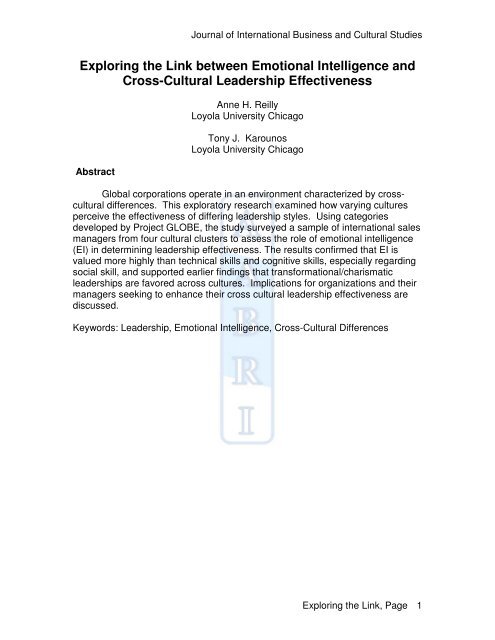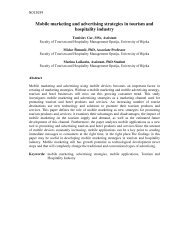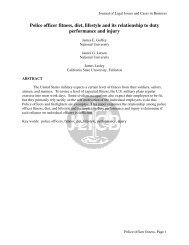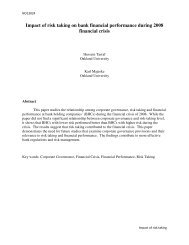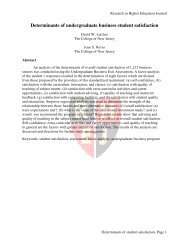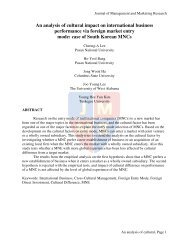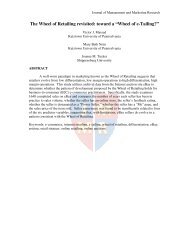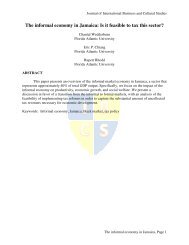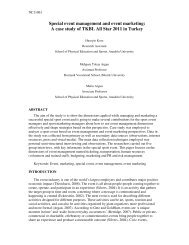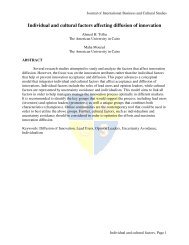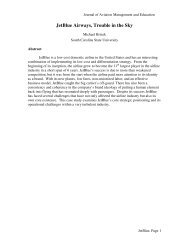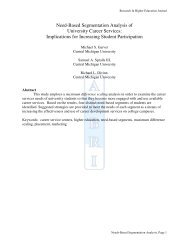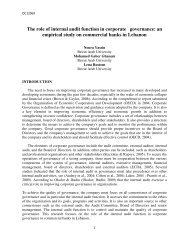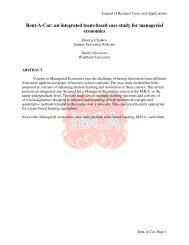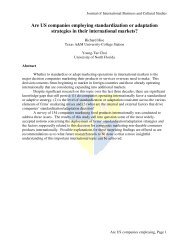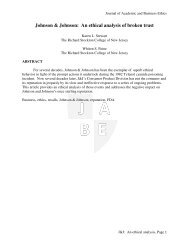Exploring the Link between Emotional Intelligence and Cross ...
Exploring the Link between Emotional Intelligence and Cross ...
Exploring the Link between Emotional Intelligence and Cross ...
Create successful ePaper yourself
Turn your PDF publications into a flip-book with our unique Google optimized e-Paper software.
Journal of International Business <strong>and</strong> Cultural Studies<br />
<strong>Exploring</strong> <strong>the</strong> <strong>Link</strong> <strong>between</strong> <strong>Emotional</strong> <strong>Intelligence</strong> <strong>and</strong><br />
<strong>Cross</strong>-Cultural Leadership Effectiveness<br />
Abstract<br />
Anne H. Reilly<br />
Loyola University Chicago<br />
Tony J. Karounos<br />
Loyola University Chicago<br />
Global corporations operate in an environment characterized by crosscultural<br />
differences. This exploratory research examined how varying cultures<br />
perceive <strong>the</strong> effectiveness of differing leadership styles. Using categories<br />
developed by Project GLOBE, <strong>the</strong> study surveyed a sample of international sales<br />
managers from four cultural clusters to assess <strong>the</strong> role of emotional intelligence<br />
(EI) in determining leadership effectiveness. The results confirmed that EI is<br />
valued more highly than technical skills <strong>and</strong> cognitive skills, especially regarding<br />
social skill, <strong>and</strong> supported earlier findings that transformational/charismatic<br />
leaderships are favored across cultures. Implications for organizations <strong>and</strong> <strong>the</strong>ir<br />
managers seeking to enhance <strong>the</strong>ir cross cultural leadership effectiveness are<br />
discussed.<br />
Keywords: Leadership, <strong>Emotional</strong> <strong>Intelligence</strong>, <strong>Cross</strong>-Cultural Differences<br />
<strong>Exploring</strong> <strong>the</strong> <strong>Link</strong>, Page 1
Introduction<br />
Journal of International Business <strong>and</strong> Cultural Studies<br />
Global corporations <strong>and</strong> <strong>the</strong>ir leaders operate in an increasingly<br />
interconnected business environment; for example, global flows of investment<br />
more than trebled, <strong>and</strong> investment in developing countries grew six fold during<br />
<strong>the</strong> 1990s (Javidan & House, 2001), <strong>and</strong> this trend has only exp<strong>and</strong>ed into <strong>the</strong><br />
2000s. Thus, many important business opportunities of <strong>the</strong> 21st century will exist<br />
outside <strong>the</strong> headquarters country (Larsen, Rosenbloom, Anderson, & Mehta,<br />
1999). Fur<strong>the</strong>rmore, <strong>the</strong> fact that <strong>the</strong> business world is becoming increasingly<br />
global does not mean that cultural differences are diminishing. Business success<br />
<strong>and</strong> profitability overseas will rely heavily on <strong>the</strong> quality of effective multinational<br />
corporate leadership (Adler, 2002), yet based on <strong>the</strong> results of a three-year study<br />
completed by Gregersen, Morrison, <strong>and</strong> Black (1998), 85 percent of U.S Fortune<br />
500 firms do not think <strong>the</strong>y have an adequate number of global leaders to sustain<br />
<strong>the</strong>ir multinational operations.<br />
A country’s culture profoundly influences <strong>the</strong> behavior of organizations as<br />
well as <strong>the</strong> behavior of people within organizations. Prior research has shown<br />
that many cross-cultural differences, such as Hofstede’s (1997)<br />
collectivism/individualism, may affect organizational performance. For example,<br />
in some cultures, people prefer to act as a cohesive group (collectivism) ra<strong>the</strong>r<br />
than as individuals motivated primarily by self-interest (individualism). Shared<br />
collectivist characteristics may include: identity based on <strong>the</strong> system, weak<br />
division <strong>between</strong> private life <strong>and</strong> work, priority on relationships, tight social<br />
networks, <strong>and</strong> external pressure or “shame.” Examples of collectivist societies<br />
include Panama, Guatemala, Colombia, Japan, Hong Kong, <strong>and</strong> India, while<br />
individualistic cultures are found in Australia, Germany, Canada, <strong>and</strong> <strong>the</strong> United<br />
States (Trompenaars, 1993; Hofstede, 1997).<br />
Fur<strong>the</strong>rmore, a nation’s specific cultural attributes play an important role<br />
in determining <strong>the</strong> selection of management <strong>and</strong> leadership style. As Leung<br />
(2005) noted in her study of Western managers in Chinese firms, effective<br />
leadership in one cultural setting may be ineffective in ano<strong>the</strong>r. Organizations<br />
become more effective when <strong>the</strong>y are able to identify <strong>and</strong> foster <strong>the</strong> appropriate<br />
leader behaviors for <strong>the</strong> relevant cultural situation. Managers are expected to<br />
arrive promptly for meetings in time-focused cultures such as <strong>the</strong> United States,<br />
while deadlines may have little importance in less time-focused cultures such as<br />
Greece or Italy (Trompenaars, 1993). Some cultures, such as India, may display<br />
a long-term orientation in terms of employee rewards <strong>and</strong> career development,<br />
compared to o<strong>the</strong>rs, such as <strong>the</strong> United States, which focus on short-term<br />
recognition <strong>and</strong> reinforcement (Ilangovan, Scroggins, & Rozell, 2007). For <strong>the</strong><br />
global manager to lead effectively in a diverse international environment, he or<br />
she must recognize cultural differences <strong>and</strong> learn to integrate culture <strong>and</strong><br />
leadership style to his/her advantage, ra<strong>the</strong>r than ei<strong>the</strong>r attempting to ignore<br />
<strong>the</strong>m or allowing <strong>the</strong>m to cause problems (Adler, 2002).<br />
<strong>Exploring</strong> <strong>the</strong> <strong>Link</strong>, Page 2
Leadership <strong>and</strong> <strong>Emotional</strong> <strong>Intelligence</strong><br />
Journal of International Business <strong>and</strong> Cultural Studies<br />
Prior research has explored <strong>the</strong> concept of emotional intelligence, which is<br />
<strong>the</strong> ability both to know one’s own emotions <strong>and</strong> to read o<strong>the</strong>rs’ emotions as well<br />
(Davies, Stankov, & Roberts, 1998; Zadel, 2008). Work by Goleman (1995;<br />
1998) has assessed <strong>the</strong> link <strong>between</strong> emotional intelligence <strong>and</strong> leadership<br />
ability. Goleman researched <strong>and</strong> analyzed 188 companies (primarily large <strong>and</strong><br />
global organizations), to determine <strong>the</strong> personal capabilities among leaders<br />
which appeared to drive outst<strong>and</strong>ing performance within <strong>the</strong>se organizations, <strong>and</strong><br />
to what degree <strong>the</strong>y did so. Personal capabilities were clustered in three<br />
categories: technical skills, such as accounting <strong>and</strong> engineering; cognitive skills<br />
like analytical reasoning; <strong>and</strong> competencies demonstrating emotional intelligence<br />
(EI), such as <strong>the</strong> ability to work with o<strong>the</strong>rs <strong>and</strong> effectiveness in leading change<br />
(Davies, et. al., 1998). According to Goleman’s research, emotional intelligence<br />
proved to be twice as important as technical skills <strong>and</strong> cognitive abilities for<br />
leadership jobs at all levels of an organization. Intellect remained a driver of<br />
outst<strong>and</strong>ing performance, <strong>and</strong> cognitive skills such as big picture thinking <strong>and</strong><br />
long-term vision were also important, but mainly as “threshold capabilities”: entrylevel<br />
requirements for executive positions.<br />
Goleman (1998) listed five components of emotional intelligence that an<br />
effective leader exhibits: self-awareness, self-regulation, motivation, empathy,<br />
<strong>and</strong> social skill. Self-awareness means having a deep underst<strong>and</strong>ing of one’s<br />
emotions, strengths, weaknesses, needs, <strong>and</strong> drives, as well as <strong>the</strong>ir effect on<br />
o<strong>the</strong>rs. Characteristics of a self-aware individual include self-confidence, realistic<br />
self-assessment, <strong>and</strong> a self-depreciating sense of humor. Self-regulation is <strong>the</strong><br />
ability to control or redirect disruptive impulses <strong>and</strong> moods <strong>and</strong> <strong>the</strong> propensity to<br />
suspend judgment--to think before acting. Characteristics include<br />
trustworthiness, integrity, comfort with ambiguity, <strong>and</strong> openness to change.<br />
Motivation, <strong>the</strong> third component, is defined as a passion to work for reasons that<br />
go beyond money or status, with a propensity to pursue goals with energy <strong>and</strong><br />
persistence. Characteristics of a motivated emotionally intelligent leader are<br />
strong desire to achieve, optimism--even in <strong>the</strong> face of failure--<strong>and</strong> organizational<br />
commitment. Empathy, <strong>the</strong> fourth component, is <strong>the</strong> ability to underst<strong>and</strong> <strong>the</strong><br />
emotional makeup of o<strong>the</strong>r people, with skill in treating people according to <strong>the</strong>ir<br />
emotional reactions. Characteristics include service to clients <strong>and</strong> customers,<br />
cross-cultural sensitivity, <strong>and</strong> expertise in building <strong>and</strong> retaining talent. Social<br />
skill, <strong>the</strong> final component of EI, is proficiency in managing relationships <strong>and</strong><br />
building networks, with an ability to find common ground <strong>and</strong> build rapport.<br />
Characteristics include effectiveness in leading change, persuasiveness, <strong>and</strong><br />
expertise in building <strong>and</strong> leading teams.<br />
<strong>Emotional</strong> <strong>Intelligence</strong> in <strong>the</strong> <strong>Cross</strong>-Cultural Context<br />
This exploratory research examines EI leadership skills in a cross-cultural<br />
setting, a linkage which has begun to be examined by scholars of international<br />
management. Prior research has identified <strong>the</strong> importance of considering<br />
emotional intelligence when selecting expatriate managers (Jassawalla, Truglia,<br />
<strong>Exploring</strong> <strong>the</strong> <strong>Link</strong>, Page 3
Journal of International Business <strong>and</strong> Cultural Studies<br />
& Garvey, 2004), <strong>and</strong> a study of managers from <strong>the</strong> U.S., <strong>the</strong> U.K., <strong>and</strong> Malaysia<br />
by Shipper, Kincaid, Rotondo, <strong>and</strong> Hoffman (2003) indicated positive<br />
relationships <strong>between</strong> manager effectiveness <strong>and</strong> <strong>the</strong> self-awareness component<br />
of EI. Leung (2005) found that <strong>the</strong> espoused competencies of EI among Western<br />
managers may clash with Chinese culture <strong>and</strong> values, <strong>and</strong> Ilangovan, Scroggins,<br />
<strong>and</strong> Rozell (2007) proposed that Indian employees will prefer a more directive,<br />
task-oriented style of leadership, compared to <strong>the</strong> participative style advocated<br />
by many U.S. managers.<br />
Following <strong>the</strong>se researchers, this study proposes that an experienced<br />
manager familiar with a country’s culture may incorporate one or more of <strong>the</strong><br />
components of emotional intelligence to effectively match <strong>the</strong> needs of a<br />
particular culture, thus leading <strong>the</strong> organization towards desired results. Many<br />
cross-cultural differences clearly exist <strong>between</strong> countries. Prior research has<br />
identified many variances in attitudes across cultures, such as power distance<br />
(Hofstede, 1997) <strong>and</strong> time focus (Trompenaars, 1993). Fur<strong>the</strong>r, studies have<br />
shown that organizational cultures are influenced by national cultures (Hofstede,<br />
1997; Adler, 2002), <strong>and</strong> <strong>the</strong> greater <strong>the</strong> cultural distance <strong>between</strong> <strong>the</strong> two<br />
countries, <strong>the</strong> greater <strong>the</strong> differences in organizational attributes <strong>and</strong> practices<br />
(Javidan & House, 2002).<br />
While it is useful to study cross-cultural differences, it is important as well<br />
to assess <strong>the</strong> extent of similarities <strong>between</strong> cultures. The study also sought to<br />
examine whe<strong>the</strong>r similar views of effective leadership may prevail across<br />
different cultures. Prior research by House <strong>and</strong> his colleagues in Project GLOBE<br />
(House, et al., 2004) found that several attributes associated with<br />
charismatic/transformational leadership were seen as contributing to outst<strong>and</strong>ing<br />
leadership across most of <strong>the</strong> cultures studied. They did note, however, that a<br />
shared preference for a type of leadership does not mean that <strong>the</strong> leader<br />
attributes will be enacted in exactly <strong>the</strong> same manner across all cultures. For<br />
example, charismatic leadership is often associated with powerful leader rhetoric,<br />
but rhetoric may range from <strong>the</strong> quiet, soft-spoken manner of Mahatma G<strong>and</strong>hi<br />
<strong>and</strong> Mo<strong>the</strong>r Teresa to <strong>the</strong> more ‘macho’ oratory of John F. Kennedy <strong>and</strong> Jack<br />
Welch (House, et al., 2004).<br />
One way to explore cultural similarities in <strong>the</strong> world is to study cultural<br />
clusters. A cultural cluster is a group of countries that share many similarities; <strong>the</strong><br />
countries in a cluster are more like each o<strong>the</strong>r than ano<strong>the</strong>r country from outside<br />
<strong>the</strong> cluster (Javidan & House, 2002). Multinational corporations may find it less<br />
risky <strong>and</strong> more profitable to exp<strong>and</strong> into more similar cultural clusters ra<strong>the</strong>r than<br />
those which are drastically different. For example, a study by <strong>the</strong> consulting firm<br />
KPMG found that <strong>the</strong> returns from cross-border mergers <strong>between</strong> U.S. <strong>and</strong> U.K.<br />
firms (both in <strong>the</strong> Anglo cultural cluster) were 45% more successful than <strong>the</strong><br />
average rate of return of all cross-border deals (Gupta, Hanges, & Dorfman,<br />
2002).<br />
To test <strong>the</strong> proposition linking EI <strong>and</strong> cross-cultural leadership, <strong>the</strong> study<br />
surveyed managers from four cultural clusters (Anglo, Latin European, Eastern<br />
European, <strong>and</strong> Sou<strong>the</strong>rn Asian) adapted from <strong>the</strong> categories of Project GLOBE.<br />
Project GLOBE was a multi-phase, multi-method research project in which some<br />
<strong>Exploring</strong> <strong>the</strong> <strong>Link</strong>, Page 4
Journal of International Business <strong>and</strong> Cultural Studies<br />
170 investigators from over 60 cultures representing all major regions in <strong>the</strong><br />
world collaborated to examine <strong>the</strong> interrelationships <strong>between</strong> societal culture,<br />
organizational culture, <strong>and</strong> organizational leadership (House, et al., 2004). In<br />
Project GLOBE, clustering of nations is utilized as a practical way to describe<br />
intercultural similarities as well as intercultural differences. In GLOBE’s analysis,<br />
61 nations are grouped into 10 distinct clusters. For this research paper, four<br />
clusters <strong>and</strong> <strong>the</strong>ir respective leadership styles <strong>and</strong> traits are reviewed: <strong>the</strong> Anglo<br />
cluster; <strong>the</strong> Latin Europe cluster; <strong>the</strong> Eastern European cluster; <strong>and</strong> <strong>the</strong> Sou<strong>the</strong>rn<br />
Asia cluster.<br />
The Anglo Cluster comprises Australia, Canada, Engl<strong>and</strong>, Irel<strong>and</strong>, New<br />
Zeal<strong>and</strong>, South Africa (White sample), <strong>and</strong> <strong>the</strong> United States of America. These<br />
countries are all developed nations, predominantly English speaking, <strong>and</strong> were<br />
all once British colonies. Today, <strong>the</strong>y are among <strong>the</strong> wealthiest countries in <strong>the</strong><br />
world (Ashkanasy, Trevor-Roberts, & Earnshaw, 2002). According to <strong>the</strong><br />
research results of Project GLOBE, charismatic, team-oriented, <strong>and</strong> participative<br />
leadership styles are perceived to be <strong>the</strong> most effective in <strong>the</strong> Anglo Cluster. The<br />
charismatic leadership behaviors include being visionary <strong>and</strong> inspirational <strong>and</strong><br />
appealing to <strong>the</strong> underlying values of followers. Shipper <strong>and</strong> his colleagues<br />
(2003) found that self-awareness of interactive skills may be a critical component<br />
to manager effectiveness in high power distance Anglo (U.S. <strong>and</strong> U.K.) cultures.<br />
Although <strong>the</strong>se leadership styles were effective across all <strong>the</strong> cultures in this<br />
cluster, each national culture does carry specific leadership behaviors that are<br />
perceived to be effective only for that specific country. For example, being<br />
charismatic in Australia can sometimes conflict with <strong>the</strong> importance of<br />
egalitarianism for successful leadership. A leader must <strong>the</strong>refore be visionary<br />
<strong>and</strong> inspirational but still be seen as “one of <strong>the</strong> boys” (Ashkanasy, et al., 2002).<br />
The Latin European cluster consists of France, French Switzerl<strong>and</strong>, Italy,<br />
Portugal, <strong>and</strong> Spain. In Latin Europe, charismatic/values-based, team oriented,<br />
<strong>and</strong> participative leadership are considered <strong>the</strong> most effective leadership<br />
attributes. Charismatic/values-based leadership consists of such attributes as<br />
visionary, inspirational, self-sacrificial, integrity, decisiveness <strong>and</strong> performance<br />
orientation. Team-oriented leadership compromises collaboration, team<br />
integration, diplomacy, <strong>and</strong> administrative competence (Jesuino, 2002).<br />
The Eastern European cluster comprises Albania, Georgia, Greece,<br />
Hungary, Kazakhstan, Pol<strong>and</strong>, Russia, <strong>and</strong> Slovenia. This region is facing<br />
significant challenges during its period of transition from communist philosophy to<br />
market based economies. The participating managers in Project GLOBE were<br />
strongly attached to <strong>the</strong>ir cultural heritage of deep family <strong>and</strong> group cohesion<br />
(Bakacsi, S<strong>and</strong>or, Andras, &Viktor, 2002). In <strong>the</strong> Eastern European cluster, <strong>the</strong><br />
key elements of successful leadership in <strong>the</strong> region were composed mostly of<br />
transformational-charismatic <strong>and</strong> team-oriented leadership. There is also a<br />
strong expectation toward participative leaders. Participation has some historical<br />
roots in <strong>the</strong> region, as large consultative bodies combined with paternalistic<br />
leadership style (asking <strong>the</strong> opinion of o<strong>the</strong>rs) has been a dominant pattern in<br />
status conscious eastern societies (Bakacsi, et al., 2002).<br />
<strong>Exploring</strong> <strong>the</strong> <strong>Link</strong>, Page 5
Journal of International Business <strong>and</strong> Cultural Studies<br />
The GLOBE Sou<strong>the</strong>rn Asia cluster consists of India, Indonesia, Iran,<br />
Malaysia, Philippines, <strong>and</strong> Thail<strong>and</strong>. In this cluster, transformational–charismatic<br />
<strong>and</strong> team-oriented leadership are perceived as <strong>the</strong> most effective leadership<br />
styles (Gupta, Surie, Javidan, & Chokar, 2002). Leaders are expected to act as<br />
patriarchs who help subordinates aspire toward more ambitious <strong>and</strong> collective<br />
goals. At <strong>the</strong> same time, <strong>the</strong>y need to make sure <strong>the</strong>ir actions <strong>and</strong> decisions help<br />
develop <strong>and</strong> sustain <strong>the</strong> team <strong>and</strong> family orientation in <strong>the</strong>ir organizations. The<br />
global leader in this cluster needs to be open to negotiations <strong>and</strong> ideas from<br />
many corners to make sure s/he does not disenfranchise any group members<br />
(Gupta, et al., 2002).<br />
Method<br />
Mid-to-upper-level international sales managers from four cultural clusters<br />
were surveyed. The focus of <strong>the</strong> sample is executives in international sales <strong>and</strong><br />
product management positions for several reasons. In many cases, <strong>the</strong><br />
international sales manager, particularly in a small-to-mid-size company<br />
environment, acts as an arms-length extension of <strong>the</strong> company which s/he<br />
represents. This manager is <strong>the</strong> primary contact point from <strong>the</strong> overseas office to<br />
<strong>the</strong> corporate office <strong>and</strong> vice versa. In <strong>the</strong> smaller company environment, <strong>the</strong><br />
sales manager must perform many corporate functions besides sales <strong>and</strong><br />
marketing, including finance, operations, <strong>and</strong> general management. For example,<br />
if a product regulatory question arises in <strong>the</strong> pharmaceutical industry, <strong>the</strong><br />
international sales manager must know about different countries’ healthcare<br />
regulations before altering product specifications.<br />
Given <strong>the</strong> dispersed geographic locations of <strong>the</strong> sample, forty surveys<br />
were e-mailed, <strong>and</strong> received twenty-seven responses, for a response rate of<br />
67.5%. The sample included executives living in <strong>the</strong> U.S., Canada, <strong>and</strong> <strong>the</strong> U.K<br />
(representing GLOBE’s Anglo cluster); Spain <strong>and</strong> Italy (Latin Europe cluster):<br />
Russia, Pol<strong>and</strong>, <strong>and</strong> Greece (Eastern Europe cluster); <strong>and</strong> <strong>the</strong> Philippines <strong>and</strong><br />
Thail<strong>and</strong> (<strong>the</strong> Sou<strong>the</strong>rn Asia cluster). The respondents worked in a variety of<br />
industries, including healthcare, consumer goods, <strong>and</strong> international services such<br />
as translation. Most worked for small or mid-sized companies; <strong>the</strong>ir average<br />
work experience was eleven years.<br />
The survey contained fifteen questions which used five-point Likert scale<br />
response options ranging from 1 = Very Important to 3 = Neutral to 5 = Not<br />
Important at All. The respondents were asked to rate <strong>the</strong> importance of technical<br />
skills, cognitive abilities, <strong>and</strong> emotional intelligence for leaders in an international<br />
setting (Questions 1 through 3). Questions 4 through 14 focused specifically on<br />
<strong>the</strong> subcomponents of emotional intelligence traits, such as social skills,<br />
participative leadership, <strong>and</strong> self-awareness (Goleman, 1998; Davies, et. al.,<br />
1998) <strong>and</strong> <strong>the</strong> leadership traits identified by Project GLOBE. For question 15,<br />
respondents were asked to rank <strong>the</strong> five most important characteristics for an<br />
international sales manager when leading a foreign sales team. The Appendix<br />
illustrates sample survey questions.<br />
<strong>Exploring</strong> <strong>the</strong> <strong>Link</strong>, Page 6
Results <strong>and</strong> Discussion<br />
Journal of International Business <strong>and</strong> Cultural Studies<br />
As Table 1 shows, <strong>the</strong> entire sample of respondents considered emotional<br />
intelligence as 1 = Very Important, <strong>and</strong> all 27 managers also selected emotional<br />
intelligence traits as <strong>the</strong> most important attributes for successful leaders, followed<br />
by cognitive abilities (mean = 1.9) <strong>and</strong> technical skills (2.3). These results<br />
support Goleman’s (1998) contention that EI is <strong>the</strong> critical component for<br />
effective leadership, <strong>and</strong> <strong>the</strong>y suggest that <strong>the</strong> emotional intelligence element of<br />
leadership may apply across different cultures.<br />
Table 1 also reports <strong>the</strong> sample’s mean rankings of <strong>the</strong> individual leader<br />
attributes studied by Project GLOBE <strong>and</strong> <strong>the</strong> emotional intelligence<br />
subcomponents. As shown, social skill, transformational/charismatic, <strong>and</strong><br />
visionary traits were rated highest among <strong>the</strong>se respondents, corresponding to<br />
GLOBE findings (see House, et al., 2004). Interestingly, self management was<br />
reported least important (mean = 2.6), suggesting that many of <strong>the</strong>se managers<br />
are more concerned with monitoring <strong>the</strong>ir external behavior, compared to <strong>the</strong>ir<br />
internal self-knowledge.<br />
Table 1<br />
Aggregate Mean Scores of Leader Traits <strong>and</strong> Attributes<br />
Selected as Most Important<br />
Ranked in order from 1 = Very Important to 5 = Not Important At All<br />
n = 27<br />
General Leader Traits/Skills Mean St<strong>and</strong>ard Deviation<br />
<strong>Emotional</strong> <strong>Intelligence</strong> Traits 1.0 0.0<br />
Cognitive Abilities 1.9 0.72<br />
Technical Skills 2.3 0.72<br />
Individual Leadership Attributes Mean St<strong>and</strong>ard Deviation<br />
Social Skills 1.2 0.4<br />
Transformational/Charismatic 1.4 0.49<br />
Visionary 1.5 0.64<br />
Team Skills 1.6 0.69<br />
Motivation 1.7 0.48<br />
Directive 1.7 0.49<br />
Participative 2.0 0.85<br />
Supportive 2.0 0.65<br />
Self-Awareness 2.2 0.74<br />
Empathy 2.2 0.89<br />
Self-Management 2.6 0.63<br />
<strong>Exploring</strong> <strong>the</strong> <strong>Link</strong>, Page 7
Journal of International Business <strong>and</strong> Cultural Studies<br />
Table 2 reports <strong>the</strong> results from survey question 15, which asked <strong>the</strong><br />
respondents to rank <strong>the</strong> five most important characteristics for an international<br />
sales manager (from <strong>the</strong> survey’s list of fourteen) when leading a foreign sales<br />
team. Again, <strong>the</strong> results paralleled those found by Project GLOBE, with<br />
transformational/charismatic, visionary, team skills, <strong>and</strong> social skills selected<br />
most often by <strong>the</strong> respondents as key attributes of effective leaders. These<br />
rankings would appear to support GLOBE’s propositions that<br />
transformational/charismatic <strong>and</strong> visionary leadership styles are universally<br />
endorsed <strong>and</strong> that team leadership is favored across cultures.<br />
Table 2<br />
Most Frequently Chosen Leadership Attributes<br />
(Survey question #15)<br />
Individual Leadership Attributes Number of Times Selected<br />
Transformational/Charismatic 21<br />
Visionary 17<br />
Team Skills 17<br />
Social Skills 17<br />
Directive 12<br />
Motivation 12<br />
Participative 9<br />
Empathy 7<br />
Self-Awareness 5<br />
Supportive 3<br />
Self-Management 3<br />
In Table 3, <strong>the</strong> survey responses are broken down by cultural cluster. As<br />
shown, <strong>the</strong>re are some interesting differences across cultures. While all four<br />
clusters selected emotional intelligence traits as most important, <strong>the</strong> individual EI<br />
<strong>and</strong> leadership traits rated as important varied. In addition, <strong>the</strong> respondents<br />
varied in terms of <strong>the</strong> importance <strong>the</strong>y assigned to <strong>the</strong> individual traits, ranging<br />
from 1.0 Very Important to 2.9 (3 = Neutral).<br />
<strong>Exploring</strong> <strong>the</strong> <strong>Link</strong>, Page 8
Journal of International Business <strong>and</strong> Cultural Studies<br />
Table 3<br />
Leader Traits <strong>and</strong> Attributes Selected Most Important, by Cultural Cluster<br />
Ranked in order from 1 = Very Important to 5 = Not Important At All<br />
Anglo Sou<strong>the</strong>rn Asia Latin Europe Eastern Europe<br />
Attribute Mean Attribute Mean Attribute Mean Attribute Mean<br />
EI Traits 1.0 EI Traits 1.0 EI Traits 1.0 EI Traits 1.0<br />
Technical 2.4 Cognitive 1.3 Cognitive 1.9 Cognitive 1.7<br />
Skills Abilities Abilities Abilities<br />
Cognitive 2.6 Technical 1.8 Technical 1.9 Technical 2.8<br />
Abilities Skills Skills Skills<br />
Individual Traits Selected:<br />
Motivated 1.4 Transformational 1.0 Social Skills 1.1 Social Skills 1.1<br />
Transformational 1.6 Social Skills 1.0 Visionary 1.3 Transformational 1.4<br />
Social Skills 1.6 Team Skills 1.0 Transformational 1.5 Directive 1.4<br />
Directive 1.6 Participative 1.3 Directive 1.8 Visionary 1.4<br />
Team Skills 1.8 Supportive 1.3 Self-Aware 1.9 Motivated 1.6<br />
Visionary 1.8 Self-Aware 1.5 Motivated 1.9 Team Skills 1.6<br />
Participative 2.0 Empa<strong>the</strong>tic 1.5 Participative 1.9 Supportive 2.3<br />
Empa<strong>the</strong>tic 2.4 Visionary 1.7 Empa<strong>the</strong>tic 1.9 Participative 2.5<br />
Supportive 2.4 Motivated 1.8 Team Skills 1.9 Self-Managed 2.5<br />
Self-Aware 2.8 Directive 1.8 Supportive 1.9 Self-Aware 2.6<br />
Self-Managed 2.8 Self-Managed 2.7 Self-Managed 2.4 Empa<strong>the</strong>tic 2.9<br />
Sample Respondents, by Country <strong>and</strong> Cluster:<br />
Anglo: Canada, United Kingdom, United States<br />
Sou<strong>the</strong>rn Asia: Philippines, Thail<strong>and</strong><br />
Latin Europe: Italy, Spain<br />
Eastern Europe: Greece, Pol<strong>and</strong>, Russia<br />
In addition, when <strong>the</strong> five components of Goleman’s emotional intelligence<br />
are examined (self-awareness, self-regulation, motivation, empathy, <strong>and</strong> social<br />
skill), only <strong>the</strong> social skill elements were consistently rated as key leader traits<br />
among <strong>the</strong> sample. According to Goleman (1998), social skill is defined as<br />
proficiency in managing relationships <strong>and</strong> building networks, with an ability to find<br />
common ground <strong>and</strong> build rapport. For almost all sales <strong>and</strong> managementoriented<br />
positions, social skill is a critical component to success, <strong>and</strong> for <strong>the</strong><br />
international sales manager, social skill also includes adapting to a different<br />
cultural setting when in an international environment. The global sales manager<br />
must familiarize him/herself with <strong>the</strong> intricacies of cultural relationships, to<br />
determine which factors build relationships within a particular cultural<br />
environment (Hofstede, 1997). For example, in Latin America, sales contracts<br />
<strong>Exploring</strong> <strong>the</strong> <strong>Link</strong>, Page 9
Journal of International Business <strong>and</strong> Cultural Studies<br />
may be negotiated at informal settings outside <strong>the</strong> office, as opposed to formal<br />
hierarchal negotiation environments (Adler, 2002).<br />
Among <strong>the</strong> Anglo respondents, <strong>the</strong> most important leadership trait was<br />
motivation. The international sales manager working abroad must make personal<br />
sacrifices such as living outside of his/her home country. Only highly motivated<br />
leaders were perceived as able to make <strong>the</strong>se sacrifices. This attitude contrasts<br />
with many o<strong>the</strong>r cultures, such as Latin Europe, where more time is devoted to<br />
family, religion, <strong>and</strong> o<strong>the</strong>r interests outside of work (Adler, 2002).<br />
In <strong>the</strong> Sou<strong>the</strong>rn Asia cluster, <strong>the</strong> survey results indicated that<br />
transformational/charismatic, social skills, <strong>and</strong> team skills were rated highest<br />
among <strong>the</strong> sample. GLOBE results also concluded that in <strong>the</strong> Sou<strong>the</strong>rn Asia<br />
cluster, team <strong>and</strong> transformational/charismatic leadership were considered most<br />
important (House, et al., 2004). Similar findings were reported by Leung (2005),<br />
who reported that Chinese culture includes a natural acceptance of hierarchy,<br />
with leaders expected to show that <strong>the</strong>ir authority is not only exerted for <strong>the</strong>ir own<br />
interest, but also for <strong>the</strong> collective’s well-being.<br />
In <strong>the</strong> Latin European cluster <strong>the</strong> most important leadership traits were<br />
social skills, visionary, <strong>and</strong> transformational/charismatic, as Table 3 illustrates. In<br />
comparison, <strong>the</strong> Eastern Europe cluster perceived social skills as <strong>the</strong> most<br />
important leadership trait, followed by visionary, directive, <strong>and</strong><br />
transformational/charismatic. Interestingly, empa<strong>the</strong>tic traits were considered<br />
least important by <strong>the</strong> Eastern Europeans in <strong>the</strong> sample, with <strong>the</strong> lowest mean<br />
reported (mean of 2.9). Despite <strong>the</strong> avowed communist tenets of collectivism,<br />
apparently <strong>the</strong> dictatorial legacy of Lenin <strong>and</strong> Stalin lives on.<br />
Conclusion <strong>and</strong> Implications<br />
As <strong>the</strong> global manager embarks on <strong>the</strong> journey abroad to lead a foreign<br />
team, <strong>the</strong>y should consider <strong>the</strong> following suggestions. First, while international<br />
managers can spend considerable effort in planning, organizing, motivating, <strong>and</strong><br />
controlling <strong>the</strong>ir subordinates, success in achieving <strong>the</strong> firm’s objectives cannot<br />
be realized without systematically studying <strong>and</strong> underst<strong>and</strong>ing <strong>the</strong> cultural<br />
environment within which <strong>the</strong>y operate (Larsen, et al., 1999; Hofstede, 1997;<br />
Shipper, et. al., 2003). As this study <strong>and</strong> substantial prior research illustrate,<br />
cultural identities play an important role in determining <strong>the</strong> selection of<br />
preferred—<strong>and</strong> effective--leadership style.<br />
Second, global leaders should attempt to match <strong>the</strong>ir leadership styles to<br />
<strong>the</strong> various cultural conditions. By using <strong>the</strong> appropriate behavior in <strong>the</strong><br />
corresponding cultural environment, global managers can enhance subordinate<br />
motivation, which, in turn, can lead to organizationally desired outcomes such as<br />
enhanced performance (Adler, 2002). For example, in <strong>the</strong> Anglo cultural cluster,<br />
an effective leader must use a team-oriented <strong>and</strong> participative leadership style.<br />
Because <strong>the</strong> countries in <strong>the</strong> Anglo cluster are relatively individualistic in cultural<br />
orientation, <strong>and</strong> all are democracies, people place great emphasis on <strong>the</strong>ir<br />
freedom <strong>and</strong> being able to have <strong>the</strong>ir say. Thus, a leader should include all<br />
relevant parties in <strong>the</strong> decision making process, delegate responsibility, <strong>and</strong> try<br />
<strong>Exploring</strong> <strong>the</strong> <strong>Link</strong>, Page 10
Journal of International Business <strong>and</strong> Cultural Studies<br />
not to lead uncompromisingly from <strong>the</strong> top (Ashkanasy, et al., 2002). In contrast,<br />
Leung (2005) found that <strong>the</strong> Western EI model of open <strong>and</strong> participative<br />
leadership contributed to <strong>the</strong> creation of ineffective, bad citizens in a Chinese<br />
firm.<br />
Fur<strong>the</strong>r, <strong>the</strong> results support prior research in emphasizing <strong>the</strong> importance<br />
of emotional intelligence to effective leadership (Goleman, 1995; 1998). Studies<br />
in multiple cultures have noted this connection. As an example, Zadel (2008)<br />
explored <strong>the</strong> intersection of emotional intelligence <strong>and</strong> employee satisfaction<br />
among Eastern European employees, while Ilangovan <strong>and</strong> colleagues (2007)<br />
compared EI competencies among Indian <strong>and</strong> U.S. managers. Fur<strong>the</strong>rmore,<br />
Jassawalla <strong>and</strong> colleagues suggest that expatriate selection should be based on<br />
specific EI competencies, as an indicator of potential adaptation to a foreign<br />
assignment (e.g., a high level of empathy will allow a manager to place oneself in<br />
ano<strong>the</strong>r’s shoes <strong>and</strong> underst<strong>and</strong> differences in values <strong>and</strong> perspectives, 2004:<br />
846).<br />
Finally, <strong>the</strong> study results suggest that <strong>the</strong> emotional intelligence trait social<br />
skill may be critical to effective global leadership. The requirement of building<br />
long-term relationships among both multicultural clients <strong>and</strong> colleagues is a good<br />
illustration for social skill, which is defined as proficiency in managing<br />
relationships <strong>and</strong> building networks with people, <strong>and</strong> an ability to find common<br />
ground <strong>and</strong> build rapport with o<strong>the</strong>rs. Companies seeking to streng<strong>the</strong>n <strong>the</strong>ir<br />
international leaders’ effectiveness may consider utilizing training programs<br />
directed at this particular leader attribute. Scholars <strong>and</strong> practitioners alike have<br />
called for emotional intelligence training to help employees recognize <strong>the</strong><br />
underlying elements of cultural differences <strong>and</strong> backgrounds (cf. Ilangovan, et. al,<br />
2007).<br />
As with any exploratory research, <strong>the</strong> project created as many questions<br />
as it answered. While a link <strong>between</strong> emotional intelligence <strong>and</strong> cross-cultural<br />
leader attributes was not established, <strong>the</strong> sample size was small, <strong>and</strong> focused<br />
mainly on small to medium sized multinational firms. Additional research with a<br />
broader sample, from large as well as small companies, would be valuable.<br />
Fur<strong>the</strong>r exploration of <strong>the</strong> social skills component of EI would also provide data of<br />
interest to international managers <strong>and</strong> organizations alike.<br />
References<br />
Adler, Nancy J. (2002). International Dimensions of Organizational Behavior,<br />
4th edition. Cincinnati: South-Western/Thomson Learning.<br />
Ashkanasy, Neal M., Edwin Trevor-Roberts, <strong>and</strong> Louise Earnshaw (2002).<br />
“The Anglo Cluster: Legacy of <strong>the</strong> British Empire” Journal of World<br />
Business, Volume 37:1, 28-39.<br />
Bakacsi-Gyula, Takacs S<strong>and</strong>or, Karacsonvi Andraqs, <strong>and</strong> Imrek Viktor (2002.<br />
“Eastern European Cluster: Tradition <strong>and</strong> Transition,” Journal of World<br />
Business, Volume 37:1, 69-80.<br />
Davies, Michaela,. Lazar. Stankov, <strong>and</strong> Richard D. Roberts (1998). “<strong>Emotional</strong><br />
<strong>Intelligence</strong>: In search of an Elusive Construct,” Journal of Personality <strong>and</strong><br />
<strong>Exploring</strong> <strong>the</strong> <strong>Link</strong>, Page 11
Journal of International Business <strong>and</strong> Cultural Studies<br />
Social Psychology, Volume 75:4, 989-1015.<br />
Goleman, Daniel (1995). <strong>Emotional</strong> <strong>Intelligence</strong>. New York: Bantam Books.<br />
Goleman, Daniel (1998). Working With <strong>Emotional</strong> <strong>Intelligence</strong>. New York:<br />
Bantam Books.<br />
Gregersen, Hal, A. Morrison <strong>and</strong> J. Stewart Black (1998). “Developing Leaders<br />
for <strong>the</strong> Global Frontier,” Sloan Management Review, Fall, 21-32.<br />
Gupta, Vipin, Gita Surie, Mansour Javidan, <strong>and</strong> Jagdeep Chokar (2002).<br />
“Sou<strong>the</strong>rn Asia Cluster: Where <strong>the</strong> Old Meets <strong>the</strong> New?” Journal of World<br />
Business, Volume 37:1, 16-27.<br />
Gupta, Vipin, Paul J. Hanges, <strong>and</strong> Peter W. Dorfman (2002). “Cultural Clusters:<br />
Methodology <strong>and</strong> Findings,” Journal of World Business, Volume 37:1,<br />
11 - 15.<br />
Ilangovan, Aarthi, Wesley A. Scroggins, <strong>and</strong> Elizabeth J. Rozell (2007).<br />
“Managerial Perspectives on <strong>Emotional</strong> <strong>Intelligence</strong> Differences <strong>between</strong><br />
India <strong>and</strong> <strong>the</strong> United States: The Development of Research Propositions,”<br />
International Journal of Management, Volume 24:3, 541-548.<br />
Hofstede, Geert (1997). Cultures <strong>and</strong> Organizations, Software of <strong>the</strong> Minds.<br />
New York: McGraw-Hill.<br />
House, Robert J., Paul J. Hanges, Mansour Javidan, Peter W. Dorfman, <strong>and</strong><br />
Vipin Gupta (2004). Culture ,Leadership, <strong>and</strong> Organizations: The GLOBE<br />
Study of 62 Societies. Thous<strong>and</strong> Oaks, CA: Sage Publications, Inc.<br />
Jassawalla, Avan, Ciara Truglia, <strong>and</strong> Jennifer Garvey (2004). “<strong>Cross</strong>-cultural<br />
Conflict <strong>and</strong> Expatriate Manager Adjustment,” Management Decision,<br />
Volume 42:7, 837-849.<br />
Javidan, Mansour <strong>and</strong> Robert J. House (2001). “Cultural Acumen for <strong>the</strong> Global<br />
Manager: Lessons from Project GLOBE, Organizational Dynamics,<br />
Volume 29:4, 289-305.<br />
Javidan, Mansour <strong>and</strong> Robert J. House (2002). “Leadership <strong>and</strong> Cultures around<br />
<strong>the</strong> World: Findings from GLOBE,” Journal of Business, Volume 37:1, 1-2.<br />
Jesuino, Jorge (2002). “Latin Europe Cluster; from South to North,” Journal of<br />
World Business, Volume 37:1, 81-89.<br />
Larsen, Trina, Bert Rosenbloom, Rolph Anderson., <strong>and</strong> Rajiv Mehta (1999).<br />
“Global Sales Manager Leadership Styles: The Impact of National<br />
Culture,” Journal of Global Marketing, Volume 13:2, 31-48.<br />
Leung, Alicia S.M. (2005). “<strong>Emotional</strong> <strong>Intelligence</strong> or <strong>Emotional</strong> Blackmail: A<br />
Study of a Chinese Professional-Service Firm,” International Journal of<br />
<strong>Cross</strong> Cultural Management, Volume 5:2, 181-196.<br />
Shipper, Frank, Joel Kincaid, Denise M. Rotondo, <strong>and</strong> Richard C. Hoffman IV<br />
(2003). “A <strong>Cross</strong>-Cultural Exploratory Study of <strong>the</strong> <strong>Link</strong>age <strong>between</strong><br />
<strong>Emotional</strong> <strong>Intelligence</strong> <strong>and</strong> Managerial Effectiveness,” International<br />
Journal of Organizational Analysis, Volume 11:3, 171-191.<br />
Trompenaars, Fons (1993). Riding <strong>the</strong> Waves of Culture: Underst<strong>and</strong>ing Cultural<br />
Diversity in Business. London: Nicholas Brealey Publishing.<br />
Zadel, Aleks<strong>and</strong>er (2008). “Do <strong>Emotional</strong>ly Intelligent Leaders Have More<br />
Satisfied Employees?” International Journal of Management <strong>and</strong><br />
Enterprise Development, Volume 5:5, 590-608.<br />
<strong>Exploring</strong> <strong>the</strong> <strong>Link</strong>, Page 12
Appendix: Sample Survey Questions<br />
Journal of International Business <strong>and</strong> Cultural Studies<br />
________ Self-awareness is described as <strong>the</strong> ability to recognize <strong>and</strong><br />
underst<strong>and</strong> your moods, emotions, <strong>and</strong> drives, as well as <strong>the</strong>ir impact on work<br />
performance <strong>and</strong> relationships.<br />
________ Transformational/charismatic is described as inspiring <strong>the</strong> interest of<br />
followers for <strong>the</strong> purpose <strong>and</strong> mission of <strong>the</strong> group. Motivates followers to go<br />
beyond <strong>the</strong>ir self-interests for <strong>the</strong> good of <strong>the</strong> group <strong>and</strong> organization<br />
_________ Motivation is described as a passion to work for reasons that go<br />
beyond money or status. A propensity to pursue goals with energy <strong>and</strong><br />
persistence.<br />
__________ Participative is described as interacting <strong>and</strong> consulting with<br />
employees, using <strong>the</strong>ir suggestions before making a decision<br />
__________ Social skill is described as proficiency in managing relationships<br />
<strong>and</strong> building networks with people. An ability to find common ground <strong>and</strong> build<br />
rapport with o<strong>the</strong>rs. A leader’s ability to manage relationships with o<strong>the</strong>rs.<br />
<strong>Exploring</strong> <strong>the</strong> <strong>Link</strong>, Page 13


